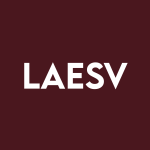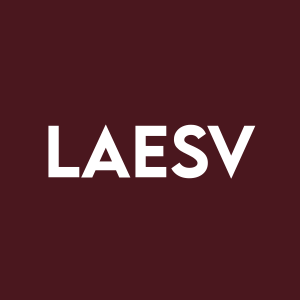Welcome to our dedicated page for LAESV news (Ticker: laesv), a resource for investors and traders seeking the latest updates and insights on LAESV stock.
LAESV (LAESV) drives innovation in quantum-resistant semiconductors and cybersecurity solutions for global enterprises. This news hub provides investors and industry professionals with essential updates on the company's technological advancements and market positioning.
Access official press releases covering product launches, financial results, strategic partnerships, and R&D milestones. Our curated collection ensures you stay informed about LAESV's developments in post-quantum cryptography, ASIC design innovations, and global channel expansions.
Key updates include earnings announcements, cybersecurity solution deployments, intellectual property achievements, and executive leadership changes. All content is verified through primary sources to maintain accuracy and relevance for decision-makers.
Bookmark this page for streamlined access to LAESV's evolving narrative in semiconductor security. Check regularly for authoritative updates that matter to your investment and industry analysis needs.
SEALSQ (NASDAQ: LAES) reported preliminary H1 2025 revenue of $4.8 million and announced FY 2025 revenue guidance of $16.0-$20.0 million, projecting 45-82% year-over-year growth. The company's cash position strengthened to $120 million as of June 30, 2025.
Key developments include the pending acquisition of IC'ALPS for EUR 12.5 million, progress in the EUR 40 million Quantix Edge project with the Spanish government, and advancement in post-quantum security solutions. The company's business pipeline stands at $145 million in revenue opportunities for 2026-2028, with expected 50-100% revenue growth in 2026.
SEALSQ is transitioning from legacy products to next-generation post-quantum semiconductors, with QVault TPM commercialization starting Q4 2025 and engineering samples of QS7001 post-quantum microcontroller already delivered to partners.
SEALSQ (NASDAQ: LAES) has announced advancements in post-quantum cryptography (PQC) to protect Bitcoin and blockchain networks from quantum computing threats. Through its QUASARS project, the company is developing hybrid cryptographic solutions and quantum-resistant hardware for IoT devices, secure communications, and blockchain protocols.
The company highlights that over 4 million BTC (25% of usable supply) are vulnerable to quantum attacks due to exposed public keys. BlackRock has acknowledged this risk in its Bitcoin ETF filings. SEALSQ's PQC-enabled microcontrollers and secure elements offer protection against quantum decryption attacks while enabling hybrid cryptographic architectures that combine classical and quantum-resistant algorithms.
SEALSQ Corp (NASDAQ: LAES) and WISeKey (SIX: WIHN, NASDAQ: WKEY) have announced the launch of the Quantum Corridor, a transnational innovation infrastructure connecting quantum, AI, cybersecurity, and semiconductor projects across Spain, France, Switzerland, and the United States.
The initiative includes several major projects: In Spain, the corridor originates in La Línea de Concepción with LLG4IR.com and connects to Málaga TechPark, plus a new €40 million Quantum Edge Hub in Murcia. In France, the corridor is anchored by SEALSQ's operational HQ in Aix-en-Provence and includes the recently acquired IC'Alps in Grenoble. The Swiss hub in Geneva serves as the coordination center, hosting various deeptech assets including WISeID, WeCan Group, WISe.ART, and WISeSat.Space. The US expansion is managed through SEALSQ USA in Arizona.
The corridor aims to foster sovereign and secure technologies by integrating physical and digital infrastructures, research institutions, startups, and industrial players in a coordinated innovation ecosystem focused on quantum-safe computing and trusted IoT infrastructure.
SEALSQ (NASDAQ: LAES) has completed a strategic investment in WeCan Group SA, acquiring a 28.30% equity stake in the Swiss blockchain and data compliance innovator. The partnership aims to accelerate the development of quantum-resilient, blockchain-based security solutions for financial services, IoT infrastructure, and Web 3.0 ecosystems.
The strategic alliance will integrate SEALSQ's hardware-based security capabilities with WECAN's financial compliance expertise. Key initiatives include integrating post-quantum encryption into WECAN's KYC/KYB platforms, developing quantum-resistant compliance tools, implementing post-quantum security algorithms in SEALSQ semiconductors, expanding Decentralized Identity solutions, and deploying Know Your Object (KYO) solutions for the Financial and Defense sectors.
The collaboration strengthens SEALSQ's position in post-quantum security and expands its presence in Europe's digital compliance and Web 3.0 sectors, while enhancing WECAN's ability to provide secure, compliant data infrastructures to financial institutions and enterprises.
SEALSQ (NASDAQ: LAES) has announced expanded capabilities to enhance security for the Internet of Medical Things (IoMT). The company's integrated solution combines Public Key Infrastructure (PKI) with Quantum-Resistant Cryptography and Post-Quantum Secure Hardware to protect healthcare systems.
The company's technology portfolio includes Smart Card reader chips integrated into IDENTIV terminals for European healthcare systems, PKI and Secure Elements for remote patient monitoring, and edge-based cryptographic authentication for AI-powered medical devices. SEALSQ's implementation of NIST-recommended algorithms like CRYSTALS-Kyber and Dilithium provides protection against both classical and quantum computing threats.
SEALSQ (NASDAQ: LAES) and WISeSat.Space have successfully launched their WISeSat 3 satellite aboard SpaceX's Falcon 9 Transporter-14 mission on June 23, 2025. The launch marks two significant achievements: the implementation of the first-ever Decentralized Physical Infrastructure Network (DePIN) from space and the advancement of quantum-safe space communications.
The satellite features SEALSQ's Quantum RootKey and enables SEALCOIN token exchanges directly from space in collaboration with Hedera. Additionally, the satellite implements post-quantum cryptography (PQC) to protect against future quantum computing threats, following NIST standards. This technology ensures secure communication between orbital and ground-based infrastructure while enabling secure key generation, distribution, and management.


